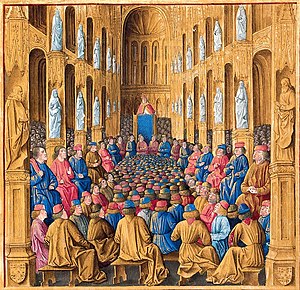Being always interested in history, someone put me on to this post on four myths about the Crusades. Let me preface this all by saying that as people we have been given the impression that the Christians were the aggressors, that their brutality is largely the cause of Muslim contempt of Christianity, and that this represents the lowest of lows for Christian history. Sadly, more people seem to know about the Crusades through an Indiana Jones movie than any real history and much of the take on this part of history is shaped by less than a full and complete review of the history and the facts.
My point here is not to glory in the Crusades or to suggest this was our finest moment. My point is to set the record a little straighter. I hope that this brief rebuttal will help set some of the record straight for those who have no access or desire to consult the primary sources.
Where this has become intertwined with modern history is in the way we have responded to the attacks upon America on 9-11 and the struggles in the Middle East to put down an inclination toward terrorism, intolerance, and brutality on the part of largely Muslim governments there. In an effort to ask "Why do they hate us," we have tended to settle for recent and simplistic answers. I hope this helps expand the field of knowledge a bit. In addition, the situation for Christians in the largely Muslim countries of the Middle East is even more precarious and threatening than ever before.
So take a read at this article by Paul Crawford over at First Principles. What everyone “knows” about the crusades may not, in fact, be true. From the many popular notions about the crusades, Crawford has picked four myths and countered them with another side to the popular but not necessarily accurate story.

2 comments:
Most informative. Thanks for the link.
My problem with the Crusades is that it has given the enemies of the Church of Christ the opportunity to associate the Church with actions which our Lord would never sanction. Did He not say to Pilate, “My Kingdom is not of this world …?” But the church at that time thought it was proper for “Christians” to recover lands lost to Muslim, as if there is such a thing as “Christian lands”, as if the Kingdom is of this world.
Does the fact that others, be they Muslims or Communists, commit cruelties against Christians, precisely because they are Christians, justify physical reprisals against them by the Christian Church? Is the business about turning the other cheek only meant for those who sit comfortably in their pews and face no threats? What about, “rejoice in that day and leap for joy”?
Nobody will dispute that the Crusaders committed cruelties against Muslims and Christians and vice versa. But keeping a ledger of who did more or who did less is pointless. If the Crusaders were indeed Christians they should not have joined this enterprise in the first place. But can I blame them? Of course not! The man who they believed was the authorized representative of Christ Himself authorized and encouraged these campaigns.
But there is one blot on the banner of the Church that few people know about, because it did not take place in the Holy Land. In what are now France, Germany, England and Italy thousands of Jews were murdered, sometimes using the most cruel means, by the Crusaders on the way to the Holy Land. Of course, much of their property was then sold to partly finance the Crusades. There was little or no opposition by the Church. The history of the persecution of the Jews that followed in these lands ultimately laid the foundation for what is known in the 20th century as the Holocaust. It is not surprising that Pius XII did little to protect the Jews at that time. The Inquisition, whose chief task was the persecution of Jews, had only been disbanded for about 50 years when he became Pope. He couldn’t understand what all the fuss was about. Hitler was merely doing what everyone else in Europe had been doing for hundreds of years with the encouragement of the Vicar of Christ, except that he put modern technology to use.
But I still say, “Peace and Joy!”
George A. Marquart
Post a Comment